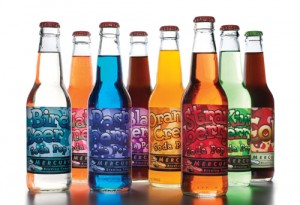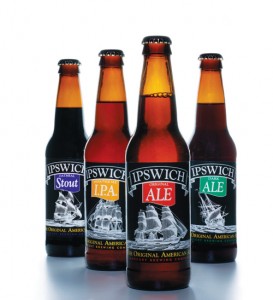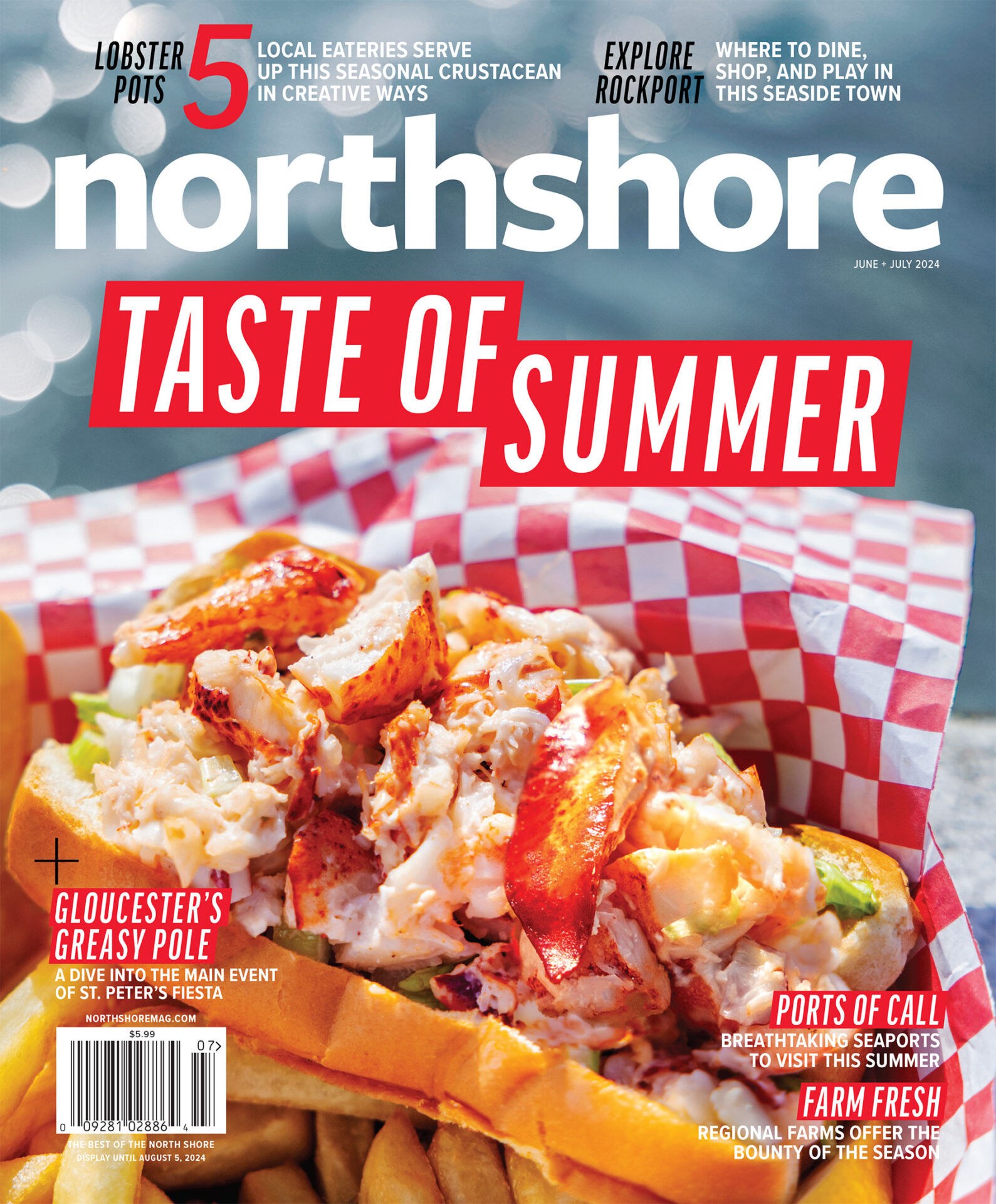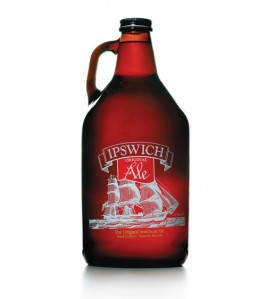 In the 10 years since, Mercury’s revenues have grown 1,000 percent, thanks to savvy expansion. The company purchased the Stone Cat beer brand and started a soda line that includes 22 products like the cane sugar, diet, and sparkling water offerings. Mercury has also expanded its contract brewing, producing beers and sodas for other companies, either to the contractor’s specifications or by developing a completely original recipe for their product. Today, the company distributes all along the Eastern seaboard.
With all of the additional business comes the need for expansion. Three years ago, Martin realized that Mercury had outgrown its space on Hayward Street in Ipswich, so he enlisted Frank Wardley, a long-time friend and architect with the Salem-based Pitman & Wardley Architects LLC for the project. After a long search for the right location, Mercury finally settled on an old building that once housed the Soffron clam processing factory just down the street.
“It’s been sitting down on the corner of Brown Square since pretty much anyone can remember,” Wardley says. “And of course, like with most buildings in Ipswich, it’s gone through a lot of transformations.”
The crew was surprised to find a beautiful brick mill building under layers of dilapidated shingles. “One of the interesting things for us is to bring that brick mill building back because it’s very contextual with Ipswich,” Wardley says. “I sort of feel for these type of buildings that we’re the caretakers for right now, and they were here long before us and they’ll be here long after us. It’s important to keep these pieces of history.”
To that end, the brick building is being restored to house a new brewpub, restaurant, function hall, and offices. Builders are adding onto the structure in a kind of horseshoe shape, allowing the physical brewery to wrap around the sides and back of the existing building. Large windows inside the brewpub will provide views into the brewery itself.
In the 10 years since, Mercury’s revenues have grown 1,000 percent, thanks to savvy expansion. The company purchased the Stone Cat beer brand and started a soda line that includes 22 products like the cane sugar, diet, and sparkling water offerings. Mercury has also expanded its contract brewing, producing beers and sodas for other companies, either to the contractor’s specifications or by developing a completely original recipe for their product. Today, the company distributes all along the Eastern seaboard.
With all of the additional business comes the need for expansion. Three years ago, Martin realized that Mercury had outgrown its space on Hayward Street in Ipswich, so he enlisted Frank Wardley, a long-time friend and architect with the Salem-based Pitman & Wardley Architects LLC for the project. After a long search for the right location, Mercury finally settled on an old building that once housed the Soffron clam processing factory just down the street.
“It’s been sitting down on the corner of Brown Square since pretty much anyone can remember,” Wardley says. “And of course, like with most buildings in Ipswich, it’s gone through a lot of transformations.”
The crew was surprised to find a beautiful brick mill building under layers of dilapidated shingles. “One of the interesting things for us is to bring that brick mill building back because it’s very contextual with Ipswich,” Wardley says. “I sort of feel for these type of buildings that we’re the caretakers for right now, and they were here long before us and they’ll be here long after us. It’s important to keep these pieces of history.”
To that end, the brick building is being restored to house a new brewpub, restaurant, function hall, and offices. Builders are adding onto the structure in a kind of horseshoe shape, allowing the physical brewery to wrap around the sides and back of the existing building. Large windows inside the brewpub will provide views into the brewery itself. Outside, Wardley’s goal is to make the new structure fit in with the rest of the neighborhood, achieving this with brick, old-fashioned corrugated metal siding, and non-operable barn doors. There will also be silos containing malted barley at one end of the building and a hop garden on the other end.
The new facility will house a full restaurant and pub with 24 taps, where patrons will be able to participate in tastings and learn how the beer is made. The windows looking down into the operations portion of the building will act as a self-guided tour.
The pub will serve everything Mercury brews. Ipswich Ale comes in nine styles, including Original Ale, IPA, Oatmeal Stout, and Nut Brown. “Ipswich Original Ale is our most popular, with Ipswich IPA coming in second,” Operations Manager Jim Dorau says. “Our Yacht Club Mix 12-packs are also very popular.” Whereas Ipswich Ale is a traditional English beer, Martin says the Stone Cat line is more irreverent, with different flavors like blueberry, pumpkin, and Hefeweizen.
Martin says that the town and its residents are very excited for the new Mercury Brewing facility to open and they keep asking him about its progress. “It does a lot of good things for the town-and the town believes this as well-that it brings tourism. It brings the Ipswich name out,” he says. “I hope that after we’re open the same amount of excitement is there.”
The Portfolio
Founded: In 1999 as Mercury Brewing Company; in 1991 as Ipswich Ale
Number of Employees: 15 (more planned when new brewery opens)
Products: Nine styles of Ipswich Ale (Original Ale, IPA, Oatmeal Stout, Dark Ale, Nut Brown, Porter, Summer, Harvest, and Winter); Nine styles of Stone Cat (Blonde, Blueberry, Extra Special Bitter, IPA, Hefeweizen, Octoberfest, Pumpkin, Scotch Ale, and Winter Lager); 22 styles of Mercury Soda (Root Beer, Diet Root Beer, Cream, Diet Cream, Black Cherry, Diet Black Cherry, Orange Cream, Lemon Lime, Atomic Grape, Birch Beer, Strawberry, Raspberry, Coconut, Kiwiberry, Watermelon, Ginger Ale, Cola, and Diet Cola) and Bubbly Waters (Lemon, Lime, Raspberry, and Orange); Ipswich Ale Mustard; Contract beers and sodas
Contact: 23 Hayward St. (soon to be located on Brown Square), Ipswich, 978-356-3329, mercurybrewing.com
Outside, Wardley’s goal is to make the new structure fit in with the rest of the neighborhood, achieving this with brick, old-fashioned corrugated metal siding, and non-operable barn doors. There will also be silos containing malted barley at one end of the building and a hop garden on the other end.
The new facility will house a full restaurant and pub with 24 taps, where patrons will be able to participate in tastings and learn how the beer is made. The windows looking down into the operations portion of the building will act as a self-guided tour.
The pub will serve everything Mercury brews. Ipswich Ale comes in nine styles, including Original Ale, IPA, Oatmeal Stout, and Nut Brown. “Ipswich Original Ale is our most popular, with Ipswich IPA coming in second,” Operations Manager Jim Dorau says. “Our Yacht Club Mix 12-packs are also very popular.” Whereas Ipswich Ale is a traditional English beer, Martin says the Stone Cat line is more irreverent, with different flavors like blueberry, pumpkin, and Hefeweizen.
Martin says that the town and its residents are very excited for the new Mercury Brewing facility to open and they keep asking him about its progress. “It does a lot of good things for the town-and the town believes this as well-that it brings tourism. It brings the Ipswich name out,” he says. “I hope that after we’re open the same amount of excitement is there.”
The Portfolio
Founded: In 1999 as Mercury Brewing Company; in 1991 as Ipswich Ale
Number of Employees: 15 (more planned when new brewery opens)
Products: Nine styles of Ipswich Ale (Original Ale, IPA, Oatmeal Stout, Dark Ale, Nut Brown, Porter, Summer, Harvest, and Winter); Nine styles of Stone Cat (Blonde, Blueberry, Extra Special Bitter, IPA, Hefeweizen, Octoberfest, Pumpkin, Scotch Ale, and Winter Lager); 22 styles of Mercury Soda (Root Beer, Diet Root Beer, Cream, Diet Cream, Black Cherry, Diet Black Cherry, Orange Cream, Lemon Lime, Atomic Grape, Birch Beer, Strawberry, Raspberry, Coconut, Kiwiberry, Watermelon, Ginger Ale, Cola, and Diet Cola) and Bubbly Waters (Lemon, Lime, Raspberry, and Orange); Ipswich Ale Mustard; Contract beers and sodas
Contact: 23 Hayward St. (soon to be located on Brown Square), Ipswich, 978-356-3329, mercurybrewing.com

